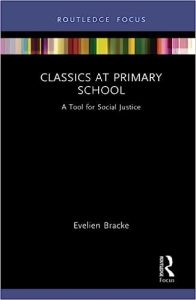In Classics at Primary School: A Tool for Social Justice, Evelien Bracke presents a comprehensive toolkit for teaching Latin and Greek at primary school to empower children who do not typically have access to Classics in education. Employing culturally responsive pedagogy and critical self-reflection, Bracke provides practical steps for repurposing the teaching of Classics, which has historically upheld social inequalities, into a tool for transformative learning, writes Jessica Richardi.
Classics at Primary School: A Tool for Social Justice. Evelien Bracke. Routledge. 2023.
Find this book (affiliate link):![]()
 Classics at Primary School is an engaging and practical guide to promoting social justice through classics. Evelien Bracke provides an exemplar of teacher self-reflection, makes a convincing case that classics can and should be employed as a tool for social equity, and explicates a justice-oriented and culturally responsive approach to pedagogy that is firmly grounded in educational research and theory. Classics at Primary School has something to offer all stakeholders in education, and it would make a particularly impactful addition to any pre-service teacher’s reading list.
Classics at Primary School is an engaging and practical guide to promoting social justice through classics. Evelien Bracke provides an exemplar of teacher self-reflection, makes a convincing case that classics can and should be employed as a tool for social equity, and explicates a justice-oriented and culturally responsive approach to pedagogy that is firmly grounded in educational research and theory. Classics at Primary School has something to offer all stakeholders in education, and it would make a particularly impactful addition to any pre-service teacher’s reading list.
In the first chapter, Bracke provides an overview of a transnational problem: the educational deprivation inflicted upon children experiencing poverty, and the effect of that deprivation on their sense of self-worth and aspirations. Classics is discussed as an historical contributor to inequity but reframed as a potential salve in the present. Chapter 2 provides examples of successful social-justice-oriented classics programmes in the US and Europe, ending with an outline of the author’s own Flemish Ancient Greeks – Young Heroes project. The third, fourth, and final chapters provide a model for creating transformative learning experiences in the classics and engaging meaningfully with local communities.
Consistent critical self-reflection is a major component of social justice education
Classics at Primary School makes an important contribution to the field of teacher education by demonstrating the effective use of self-reflection to improve one’s practice. Consistent critical self-reflection is a major component of social justice education, and the author’s reflective practice is informed by her orientation toward justice, diversity, and equity. She describes personal experiences and professional missteps in great detail (for instance, failing to address a child’s verbal expression of racist ideology), making her thinking visible by parsing these moments and explaining their consequences for her future actions. Far beyond lessons in what not to do, these classroom vignettes and frank discussions of teacher misunderstandings demonstrate best practice for educator self-reflection and the iterative process of improving one’s teaching and expanding one’s perspective. To facilitate the reader’s own self-reflection, the author includes a useful reflective tool at the end of each chapter. These are not gimmicks, but meaningful exercises that will encourage readers to confront their current understandings and biases relating to diversity and equity, teaching and learning.
Historically, classics have played a role in perpetuating social inequity in Western societies.
Another notable contribution of the book is the cogent argument it makes for classics as a tool for social justice. Historically, classics have played a role in perpetuating social inequity in Western societies, and classical languages remain largely inaccessible to disadvantaged and minoritised populations today. For children experiencing poverty, the Greek and Latin languages appear out of reach, obscure and difficult to acquire; yet by virtue of their perceived social value among elites, they retain a sheen of power and prestige. The author argues that the incomparable experience of success in an Ancient Greek or Latin classroom can empower underprivileged children to challenge and transform the pervasive, debilitating stereotype that they are somehow less capable than more affluent peers. It is an attractive argument. It centres the learner’s experience of classical languages rather than their tangible academic benefits and proposes that that we utilise the very role of classics as an historical contributor to social inequity as a foil against it. There is no doubt that some will disagree with the author’s proposal, but her argument is well made and the positive results of her projects and others, discussed throughout the book, lend it further credence.
The author admits, however, that expanded access to classics is not enough to enact real change in the lives of disadvantaged children. Rather, access must be wedded to appropriately modified pedagogy. Children’s personal knowledge and cultural experiences (viewed as assets rather than deficits) must be centred and leveraged to harness the transformative power of classical languages. This approach has much in common with culturally responsive teaching, an approach that taps into the cultural knowledge and personal experiences of ethnically diverse children to make learning activities more meaningful.
[A] comprehensive toolkit for building a classics programme based upon culturally responsive pedagogy and aiming to foster transformative learning.
Indeed, the most singular and significant contribution of this book is its comprehensive toolkit for building a classics programme based upon culturally responsive pedagogy and aiming to foster transformative learning. The author provides concrete steps toward this goal, each fully grounded in current research and established theory. The Young Heroes project, which seeks to empower disadvantaged children through knowledge of Ancient Greek language and culture, yields authentic examples of the steps in practice.
Jack Mezirow’s work on transformative learning underpins the author’s strategies for improving her pupils’ debilitating lack of academic self-esteem. Through carefully designed and impactful ‘disorienting’ experiences, the children of Young Heroes confront stereotyped beliefs about themselves and others and shift to a more healthful frame of reference. The author recommends diversifying the classical canon by including diverse peoples and geographies not traditionally represented in the curriculum, a practice in line with current research on multicultural education. Bracke also recommends and details strategies for employing backwards design, exploring cultural perceptions, the co-creation of knowledge, and facilitating conversations to resolve cultural conflict.
The crucial role that children’s cultural contexts play in yielding transformative learning outcomes and [the] importance of community engagement rather than community outreach.
The author addresses the more ‘nitty-gritty’ issues of lesson planning in the fourth chapter, with the goals of transformative learning and social equity remaining in the foreground. How should I teach the Ancient Greek alphabet? What about the trickier aspects of Greek and Latin grammar? How can I avoid rote learning? Questions like these are anticipated and answered extensively using copious examples from the author’s experience heading the Young Heroes project. The book closes with strategies to encourage community participation, including suggestions to address public concerns about classics initiatives. The author reiterates the crucial role that children’s cultural contexts play in yielding transformative learning outcomes and stresses the importance of community engagement rather than community outreach.
Classics at Primary School is an engaging and accessible read that has something to offer all educators, classics or not, who are interested in teaching for social justice or adopting a more culturally responsive approach. The author’s demonstrated use of effective self-reflection, her argument for how classical languages have a place in social justice activism, and her detailed practical guide for creating transformative learning experiences within classics programmes are important contributions to the professional fields of classics and education.
- Main Image Credit: Taylor Flowe on Unsplash.
- This review first appeared at LSE Review of Books.
- Please read our comments policy before commenting.
- Note: This article gives the views of the author, and not the position of USAPP – American Politics and Policy, nor of the London School of Economics.
- Shortened URL for this post: https://bit.ly/444aRgN






